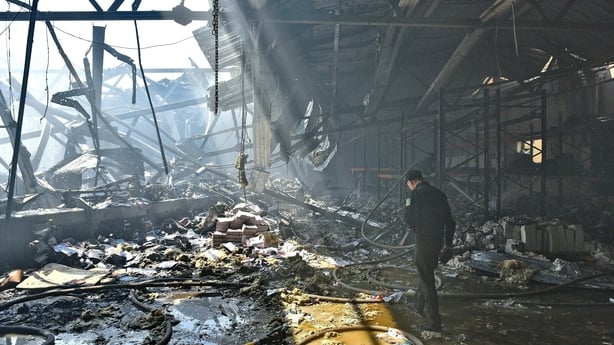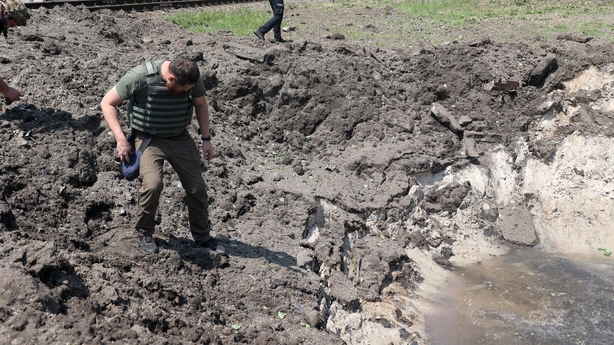Russian President Vladimir Putin has said that Ukrainian President Volodymyr Zelensky has no legitimacy following the expiry of his five-year term and this would raise a legal obstacle if Russia and Ukraine were to resume peace talks.
With Ukraine still under martial law in the third year of Russia's full-scale invasion, Mr Zelensky has not faced elections despite the ending of his term in office this week - something he and Ukraine's allies deem to be the right decision to take at a time of war.
President Putin is ready to halt the war with a negotiated ceasefire that recognises the current battlefield lines, four Russian sources have said, but is ready to fight on if Kyiv and the West do not respond.
However, at a news conference during a visit to Belarus, Mr Putin said the status of President Zelensky was problematic.
"But who to negotiate with? That's not an idle question ... Of course we realise the legitimacy of the incumbent head of state is over," he said.
President Putin said the West would use a Swiss-hosted conference on the war, due to take place next month, to endorse Mr Zelensky's legitimacy but these were "PR steps" with no legal meaning.
Peace, the Russian leader said, should be worked out through common sense, not ultimatums, based on draft documents that were worked out between the two sides in the early weeks of the war, and on "today's realities on the ground" - a reference to the fact that Russia controls nearly 20% of Ukraine.
"If it gets to that point, we will need of course to understand who we should and can deal with, to arrive at signing legally binding documents. And then we must be fully sure we are dealing with legitimate (Ukrainian) authorities," Mr Putin said.
His comments are likely to be taken by Ukraine and its Western allies as further evidence that he has no real intention of entering peace talks, despite frequently stating his willingness to negotiate.
President Zelensky has repeatedly said that peace on Mr Putin's terms is a non-starter.
He has vowed to retake lost territory, including Crimea, which Russia annexed in 2014 and signed a decree in 2022 that formally declared any talks with the Russian leader "impossible".
Russia has been 'stopped' in Kharkiv - Ukraine
Earlier, the Ukrainian army said it had "stopped" Russia from advancing further into the northeastern Kharkiv region and is counter-attacking, but Moscow is intensifying its assault on other parts of the front.
Ukraine has been battling a fresh Russian land assault in the Kharkiv region since 10 May when thousands of troops stormed the border in Moscow's biggest territorial advances in 18 months.
President Zelensky visited the region's capital to discuss the battle for Vovchansk, a town that sits fewer than 5km from the border.
"The Ukrainian Defence Forces have stopped Russian troops in the Kharkiv sector. The situation is under control, counter-offensive actions are under way," the army said.
Despite initial success, "the enemy has got completely bogged down in street battles for Vovchansk and suffered very high losses in assault units", Ukraine's commander-in-chief Oleksandr Syrsky said on social media.

In an attempt to seize the town, Russia "is currently moving reserves from different sectors to support active assault operations, but to no avail", Mr Syrsky added.
He warned, however, that the situation was turbulent on the eastern front, where Russia says its forces have made a string of gains in the past two weeks.
Fighting near the towns of Chasiv Yar, Pokrovsk and Kurakhove has been particularly "intense", he added.
Russia said yesterday that it had made inroads near the city of Bakhmut in the eastern region of Donetsk.
Earlier this week, it claimed to have seized the village of Bilogorivka, a key target for Moscow, which is seeking to wrest control of the entire Lugansk region from Kyiv.
Russia launched the offensive in Ukraine's northeast to create what it called a "buffer zone" along the border to prevent future Ukrainian attacks on its territory.

As Ukraine rushed troops to the northeast, it again accused Russia of deliberately targeting civilians in strikes.
State-owned train operator Ukrainian Railways reported a flurry of attacks on the Kharkiv region's railway system overnight that damaged tracks, carriages and buildings.
"The enemy continues to make deliberate attempts to stop the railway in Kharkiv region," it said on social media.
The company shared photos showing smoke rising from a wrecked carriage, twisted metal and debris beside tracks, and a depot with blown-out windows.
Long-distance and suburban trains were running as scheduled, the state railway monopoly said, despite repeated Russian strikes on the network, which is vital for both civilians and the military.
Strikes on the city of Kharkiv, Ukraine's second-largest, killed at least seven people yesterday, local authorities said.
More than 11,000 people in the wider region have been moved since Russia began its new offensive two weeks ago, according to local governor Oleg Synegubov.
Separately, Ukraine fired missiles overnight at the Russian-occupied Crimean peninsula, killing two "chance passers-by", the Moscow-installed head of the region, Sergei Aksyonov, said.

